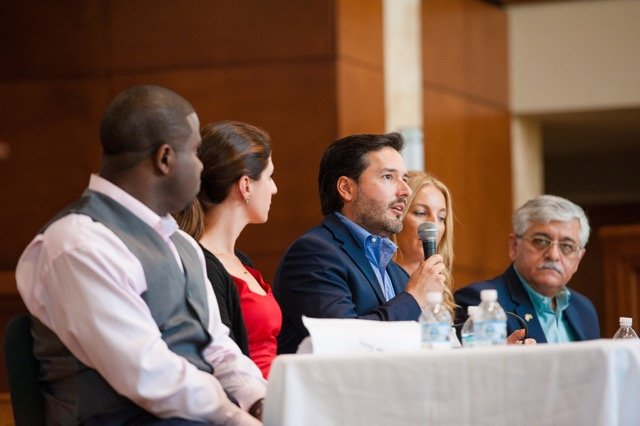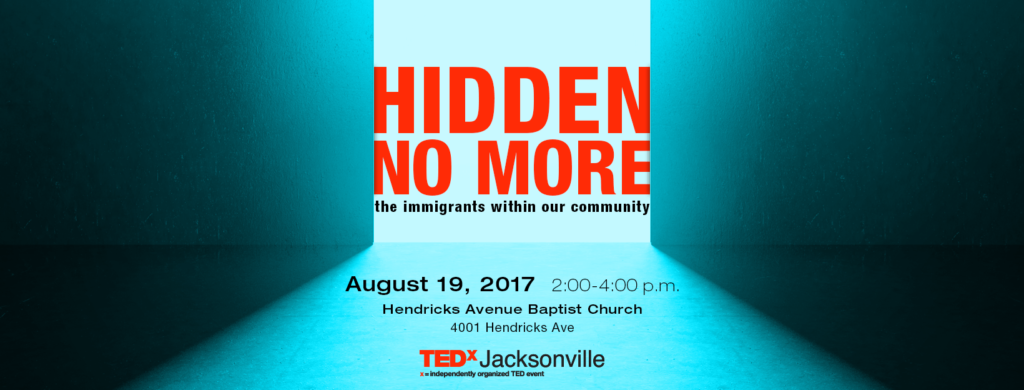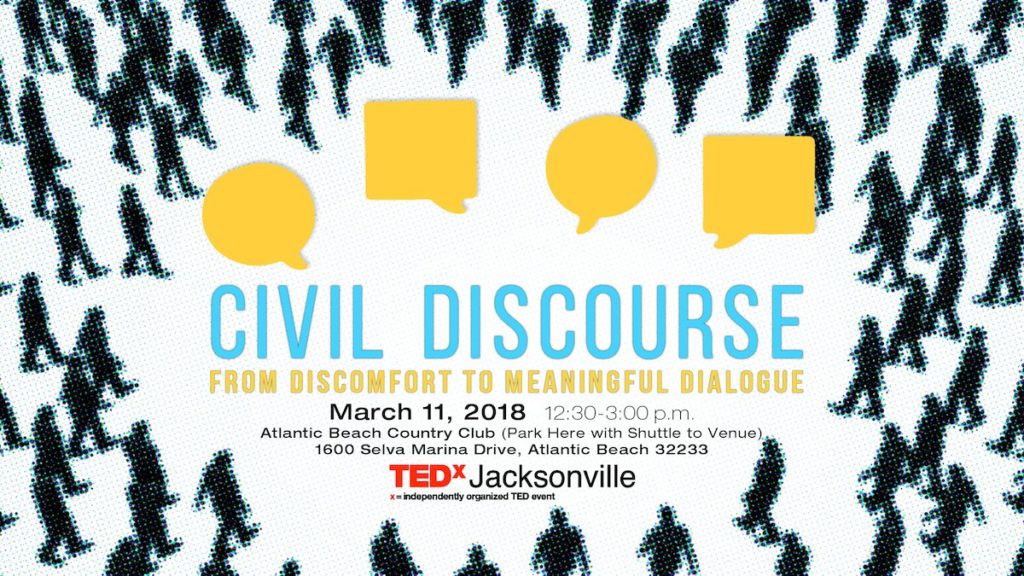
- Mario Decunto, Mental Health Therapist, Member of Mayor’s Hispanic Advisory Board
- Dane Grey, President and CEO, Elite Parking Services of America
- Arjola Miruku, Founder and Director, Play Academy of Arts
- Mobeen H. Rathore, MD, Professor and Director, UF Center for HIV/AIDS, Research, Education & Service (UF CARES) and Chief, Pediatric Infectious Diseases and Immunology, Wolfson Children’s Hospital
- Fuada Velic, CEO, Accounting At All Cost

L to R: Sabeen Perwaiz Syed, Mario Decunto, Arjola Miruku, Dane Grey, Fuada Velic, and Dr. Mobeen Rathore.
 Arjola Miruku:
Arjola’s family moved to Ponte Vedra from Albania when she was 12 years old; she knew no English and was enrolled at Landrum Middle School. The journey to learn English was a long one — hours and weeks of sitting in the school hallway with a book and a cassette player, listening and following along, learning the English language during school hours while reading and writing Albanian in the evenings so as not to forgot her native tongue and heritage. Arjola’s parents encouraged a dedication to both arts and academics; sacrificing one for the other was not an option. Arjola went on to learn English and earn all As that semester, to enroll in Douglas Anderson School of the Arts for piano during high school, and to become valedictorian her senior year. Arjola’s experiences inspired her to become an educator. She now owns her own company, Play Academy of the Arts, and teaches piano.
On otherness and feeling different, Arjola discussed how novelty is so exciting when you are young–you don’t yet know bias, and everyone is on an even playing field. As we grow up, the walls come up and differences are magnified. Arjola discusses the importance of being an educator and the ability to use difficult experiences and interactions to drive discussions about diversity and differences.
Mobeen H. Rathore, MD:
Mobeen and his family were in the country for 17 years before 9/11; they were established in their communities, jobs, and schools. As expected 9/11 brought about a time of racially charged attitudes and actions—in this period of fear and a heightened sense of otherness, a neighbor’s friendly words were the comfort needed to push forward.
Mobeen is a physician and is the Founding Director of the University of Florida Center for HIV/AIDS Research, Education, and Service (UF CARES) and Professor at the University of Florida College of Medicine. At the age of 23, Mobeen came to America and underwent the long transferring and credentialing process. Many immigrants that come to America as professionals have already trained in their home countries, and must take the time and effort to prove themselves at the same proficiency level as American physicians.
Fuada Velic:
In 1995, Bosnian Serb forces killed more than 8,000 Muslim men and boys during the Bosnian War. From ages 8 to 16, Fuada Vedic lived in her basement in Bosnia with no electricity and limited food.
She lost her father and her grandfather. In 2000, Fuada and her mother came to the United States to Jacksonville with one plastic bag filled with everything that was not lost in the war. Fuada attended high school, while taking care of her mother and learning English. She reflected on the importance of her school, educators, first job, and managers in her continued success.
In November 2016, 16 years after moving to America, Fuada was asked to represent Bosnia in the Paris Marathon. Fuada is an avid runner, and has been since her childhood, when she ran to divert her mind from the difficulties and struggles of the time.
As we continue to examine the Jacksonville community in an effort to encourage inclusivity, we must not be afraid to hide our otherness. We must instead use our otherness as an opportunity to drive discussion.
We must be aware of differences, be willing to listen, and refocus our political structure to one that is inclusive, diverse, and representative of the community. Our Salon reminded us of the strength that comes in being different.
Let’s be different, together.
~ by Miya Kusumoto
Arjola Miruku:
Arjola’s family moved to Ponte Vedra from Albania when she was 12 years old; she knew no English and was enrolled at Landrum Middle School. The journey to learn English was a long one — hours and weeks of sitting in the school hallway with a book and a cassette player, listening and following along, learning the English language during school hours while reading and writing Albanian in the evenings so as not to forgot her native tongue and heritage. Arjola’s parents encouraged a dedication to both arts and academics; sacrificing one for the other was not an option. Arjola went on to learn English and earn all As that semester, to enroll in Douglas Anderson School of the Arts for piano during high school, and to become valedictorian her senior year. Arjola’s experiences inspired her to become an educator. She now owns her own company, Play Academy of the Arts, and teaches piano.
On otherness and feeling different, Arjola discussed how novelty is so exciting when you are young–you don’t yet know bias, and everyone is on an even playing field. As we grow up, the walls come up and differences are magnified. Arjola discusses the importance of being an educator and the ability to use difficult experiences and interactions to drive discussions about diversity and differences.
Mobeen H. Rathore, MD:
Mobeen and his family were in the country for 17 years before 9/11; they were established in their communities, jobs, and schools. As expected 9/11 brought about a time of racially charged attitudes and actions—in this period of fear and a heightened sense of otherness, a neighbor’s friendly words were the comfort needed to push forward.
Mobeen is a physician and is the Founding Director of the University of Florida Center for HIV/AIDS Research, Education, and Service (UF CARES) and Professor at the University of Florida College of Medicine. At the age of 23, Mobeen came to America and underwent the long transferring and credentialing process. Many immigrants that come to America as professionals have already trained in their home countries, and must take the time and effort to prove themselves at the same proficiency level as American physicians.
Fuada Velic:
In 1995, Bosnian Serb forces killed more than 8,000 Muslim men and boys during the Bosnian War. From ages 8 to 16, Fuada Vedic lived in her basement in Bosnia with no electricity and limited food.
She lost her father and her grandfather. In 2000, Fuada and her mother came to the United States to Jacksonville with one plastic bag filled with everything that was not lost in the war. Fuada attended high school, while taking care of her mother and learning English. She reflected on the importance of her school, educators, first job, and managers in her continued success.
In November 2016, 16 years after moving to America, Fuada was asked to represent Bosnia in the Paris Marathon. Fuada is an avid runner, and has been since her childhood, when she ran to divert her mind from the difficulties and struggles of the time.
As we continue to examine the Jacksonville community in an effort to encourage inclusivity, we must not be afraid to hide our otherness. We must instead use our otherness as an opportunity to drive discussion.
We must be aware of differences, be willing to listen, and refocus our political structure to one that is inclusive, diverse, and representative of the community. Our Salon reminded us of the strength that comes in being different.
Let’s be different, together.
~ by Miya Kusumoto





